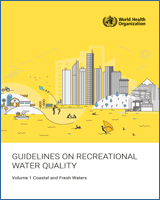Guidelines on Recreational Water Quality
Overview
Use of coastal, estuarine and freshwater recreational environments has significant benefits for health and well-being, including rest, relaxation, exercise, cultural and religious practices, and aesthetic pleasure, while also providing substantial local, regional and national economic benefits. These guidelines focus on water quality management for coastal and freshwater environments to protect public health. The guidelines:
- describe the current state of knowledge about the possible adverse health impacts of various forms of water pollution; and
- set out recommendations for setting national health-based targets, conducting surveillance and risk assessments, putting in place systems to monitor and control risks, and providing timely advice to users on water safety.
These guidelines are aimed at national and local authorities, and other entities with an obligation to exercise due diligence relating to the safety of recreational water sites. They may be implemented in conjunction with other measures for water safety (such as drowning prevention and sun exposure) and measures for environmental protection of recreational water use sites.
This publication is the update of the Guidelines published in 2003 entitled “Guidelines for safe recreational water environments. Volume 1, Coastal and fresh waters”.
Suggested citation:
Guidelines on recreational water quality. Volume 1: coastal and fresh waters. Geneva: World Health Organization; 2021. Licence: CC BY-NC-SA 3.0 IGO.
General disclaimers. The designations employed and the presentation of the material in this publication do not imply the expression of any opinion whatsoever on the part of WHO concerning the legal status of any country, territory, city or area or of its authorities, or concerning the delimitation of its frontiers or boundaries. Dotted and dashed lines on maps represent approximate border lines for which there may not yet be full agreement.
The mention of specific companies or of certain manufacturers’ products does not imply that they are endorsed or recommended by WHO in preference to others of a similar nature that are not mentioned. Errors and omissions excepted, the names of proprietary products are distinguished by initial capital letters.
All reasonable precautions have been taken by WHO to verify the information contained in this publication. However, the published material is being distributed without warranty of any kind, either expressed or implied. The responsibility for the interpretation and use of the material lies with the reader. In no event shall WHO be liable for damages arising from its use.
Sales, rights and licensing. To purchase WHO publications, see http://apps.who.int/bookorders. To submit requests for commercial use and queries on rights and licensing, see http://www.who.int/about/licensing.
Third-party materials. If you wish to reuse material from this work that is attributed to a third party, such as tables, figures or images, it is your responsibility to determine whether permission is needed for that reuse and to obtain permission from the copyright holder. The risk of claims resulting from infringement of any third-party-owned component in the work rests solely with the user.
Some rights reserved. This work is available under the Creative Commons Attribution-NonCommercial-ShareAlike 3.0 IGO licence (CC BY-NC-SA 3.0 IGO; https://creativecommons.org/licenses/by-nc-sa/3.0/igo).
Under the terms of this licence, you may copy, redistribute and adapt the work for non-commercial purposes, provided the work is appropriately cited, as indicated below. In any use of this work, there should be no suggestion that WHO endorses any specific organization, products or services. The use of the WHO logo is not permitted. If you adapt the work, then you must license your work under the same or equivalent Creative Commons licence. If you create a translation of this work, you should add the following disclaimer along with the suggested citation: “This translation was not created by the World Health Organization (WHO). WHO is not responsible for the content or accuracy of this translation. The original English edition shall be the binding and authentic edition”.
Any mediation relating to disputes arising under the licence shall be conducted in accordance with the mediation rules of the World Intellectual Property Organization (http://www.wipo.int/amc/en/mediation/rules/).
